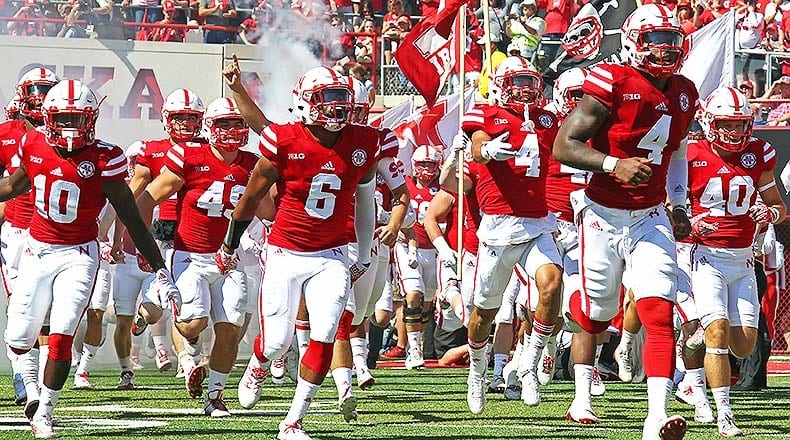Widespread pushback among its fan base led Nebraska to chance its mind regarding mobile-only ticketing, at least for the upcoming fall football season. Athletic Director Trev Alberts announced the decision via Twitter last week, bowing to fan demands that their right to receive a paper ticket and parking pass for games not be stripped.
“Nebraska Football Season Ticket Holders,” his announcement read. “I want you to know that we will always listen and be responsive to our fans. To that end, Nebraska Athletics will now be providing you with the option of receiving printed tickets and parking passes this season.”
Nebraska Football Season Ticket Holders,
I want you to know that we will always listen and be responsive to our fans. To that end, Nebraska Athletics will now be providing you with the option of receiving printed tickets and parking passes this season. pic.twitter.com/o6fyD25RTj
— Trev Alberts (@TrevAlberts) July 22, 2021
A recent hire to lead Nebraska Athletics, Alberts took advantage of the opportunity to make a quick and popular impact on the fan experience, with this decision spurred by the strongly negative reaction from fans who didn’t want to be forced away from paper tickets in favor of the data-grabbing and breakdown-prone mobile systems.
“A portion of our fan base spoke very clearly in preference of a paper ticket option which led to our decision to make that available,” Nebraska Sports Information Director Keith Mann told TicketNews. “Trev Alberts has been very clear that we will listen and be responsive to our fan base and this was one of the first ways we responded shortly after his hiring.”
The response to Alberts’ announcement shows quickly how much fans are against the mobile-only shift, which has been going on in many ticketing systems in the wake of COVID:



The decision is only meant to be temporary, according to a follow-up tweet from Alberts. “Long term we intend to continue the transition to mobile ticketing, but we heard the message from many of you regarding a desire for printed tickets,” he said.
Following the school’s announcement this summer that it would go mobile-only, the negative reaction saw swift. Coverage in SI’s FanNation website outlined the fact that a number of fans collect ticket stubs as souvenirs, and also the small percentage of issues that arise with mobile-only systems that lock people out of events.
A friend of mine who has been a longtime College World Series season ticket holder had his first experience with digital tickets last month in Omaha.
Of the new technology, he said, “For us, it was really easy to get into the game. But for some people who were in the line with us, it was frustrating. Due to some technical snafus, they couldn’t get in. They ended up having to go to a bar to watch the game.”
So these people bought tickets, paid for parking, walked to the ballpark, but were denied entrance? Ouch!
If that happens in Lincoln come Sept. 4, Husker fans will be livid. Okay, so maybe digital ticketing works 99% of the time. What about the other 1% (.01 x 90,000=900 fans) who might not be able to get in? If they’ve driven a long way to get to Memorial Stadium and can’t see the game in person, there will be some pretty unhappy Husker fans – and lots of extra people crammed into the bars in Lincoln.
And then there’s the actual reason that drives any organization to forcing consumers into a mobile-only ecosystem against their wishes: data and removal of consumer choice in what happens to their tickets. Mobile-only ticketing systems allow event operators access to an enormous amount of user data, with users required to opt in for data-sharing with marketing partners as part of the process of accessing their tickets. Data is harvested, and privacy policies allow the ticketing company to essentially do whatever they wish with that data. It is big business, and unquestionably drives value for the ticketing operation, indeed serving as the basis for enormous contracts.
In several states, event organizers are required by law to offer consumers the option to have their tickets delivered in a manner that is not controlled end-to-end by the primary ticketing vendor. New York just extended its existing law providing such protections, and is considering additional protections in the coming year. Connecticut, Virginia, Colorado and Illinois also feature those protections for their residents. Consumers in other states can find themselves unable to do anything with tickets for events they cannot attend if they have something come up – or get sick – due to anti-resale technology tied to mobile-only ticketing systems.
When faced with mobile-only ticketing systems being introduced, there is usually protest. Many consumers, particularly older consumers or lower-income consumers – two groups with lower percentage of smartphone usage, push back. Nebraska’s decision to hold off, even temporarily, is a rare instance of those groups actually seeing their voices heard by the organization in charge rather than just drowned out in favor of the business side of the decision.




